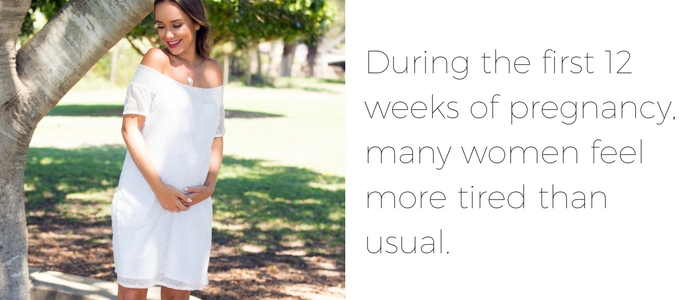
A missed period is the most obvious indication of a potential pregnancy for women who have a regular menstrual cycle. But with all the changes occurring in a woman’s body, there are other signs which may indicate you’re in the early stages of pregnancy even before you notice this.
In fact, the signs of pregnancy can be noticeable from as early as week one.
In the first few weeks following conception, you may experience a number of physical, mental and emotional changes. You may not experience all of them, but if you do it may be a good idea to visit your doctor.
Here’s what you should look out for, and some tips on how to manage each of the symptoms.
Nausea and vomiting
This symptom of pregnancy is commonly known as morning sickness, but for some women, feeling sick can occur during any time of the day or night. If you can’t keep anything down, particularly while eating your main meals, consult your doctor.
Tip: Drink plenty of water as excessive vomiting can cause dehydration
Feeling fatigued
During the first 12 weeks of pregnancy, many women feel more tired than usual. Blood pressure drops and blood vessels dilate when you’re pregnant, meaning you may feel lightheaded or dizzy. It’s important to remain well rested during your pregnancy to prevent draining your energy.
Tip: Time your sleep or set alarms to ensure your body gets enough rest. Sleep in a room with a cooler temperature to maximise comfort.
Changes in your breasts
Just like they might before your period, your breasts can physically change during the early weeks of pregnancy. They may feel tender or sore, and can look bigger or fuller in size. It’s also common to feel a tingling sensation in your breasts. The veins around your breasts may be more prominent, and your nipples may also look noticeably different, for example by standing out or darkening in colour
Tip: Wear a comfortable and adjustable maternity bra that has soft breast pads to reduce friction and prevent nipple pain.

Irregular bladder and bowel movement
Urinating more often, particularly at night, can be a sign of pregnancy, as can irregular bowel movements and constipation. Increased vaginal discharge without soreness or irritation can also be an early warning sign. But if you’re experiencing any irregular discharge that you’re unsure about, contact your doctor.
Tip: Avoid foods that may bloat you. Fruits and high fibre foods can lessen the discomfort or occurrence of constipation.
Spotting
Small amounts of vaginal bleeding, known as implantation bleeding, happen during early pregnancy after the fertilised egg attaches to the lining of the uterus. It’s different to bleeding on a normal period, as it’s spotting that’s lighter in colour and doesn’t last as long as a period.
Tip: Don’t ignore signs of bleeding in later stages of pregnancy, beyond the first trimester, especially if excessive. You should contact your doctor if you experience this.
Mood swings
Aside from the physical effects of pregnancy, you may also experience mental and emotional changes due to a shift in hormone levels. Estrogen and progesterone levels are high during pregnancy and can result in feelings of anxiety and irritability. Producing these hormones is crucial for a healthy and successful pregnancy, and the good news is that managing and minimising negative reactiveness on a day-to-day basis is possible.
<Tip: Light exercise, a nutritious diet, relaxation and restful sleep help reduce mood swings.
Intuition
While this one might be less obvious or convincing, don’t ignore it. A woman’s intuition about her body and its changes doesn’t emerge for no reason. It may be because you feel a bit sick or not your usual self, but either way you should pay a visit to your doctor and let them know what you are experiencing. Even if it’s not due to pregnancy, your doctor will be able to help you determine what the cause is, if any.
Tip: Create a list of factors that may be affecting your health, such as the time of your last menstrual cycle, and take it with you to your doctor’s appointment.
What to do next
Getting tested and confirming your pregnancy as early as possible will help you prepare for the later stages of pregnancy and, of course, for bringing your baby to their new home. Learn more about pregnancy from week one onwards by downloading our free guide to your pregnancy week-by-week here.
